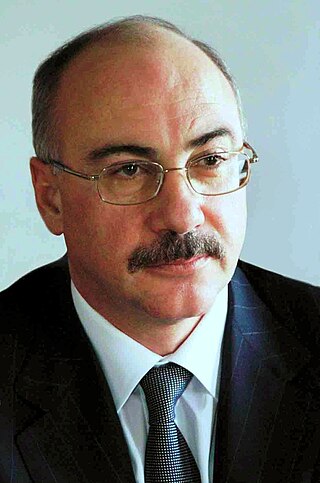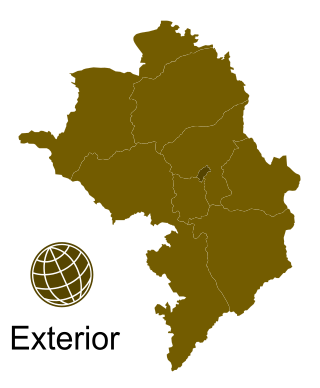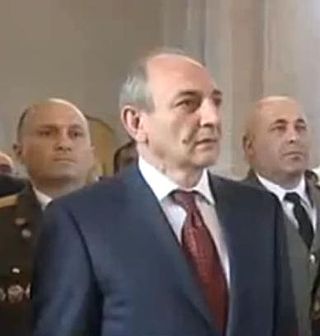
Artsakh, officially the Republic of Artsakh or the Republic of Nagorno-Karabakh, was a breakaway state in the South Caucasus whose territory was internationally recognised as part of Azerbaijan. Between 1991 and 2023, Artsakh controlled parts of the former Nagorno-Karabakh Autonomous Oblast of the Azerbaijani Soviet Socialist Republic, including its capital Stepanakert. It had been an enclave within Azerbaijan from the 2020 Nagorno-Karabakh war until the 2023 Azerbaijani offensive, when the Azerbaijani military took control over the remaining territory controlled by Artsakh. Its only overland access route to Armenia after the 2020 war was via the 5 km (3.1 mi) wide Lachin corridor, which was placed under the supervision of Russian peacekeeping forces.

Arkadi Arshaviri Ghukasyan is an Armenian politician who served as the second President of the self-proclaimed Nagorno-Karabakh Republic. He was elected as the President on 8 September 1997 and re-elected in 2002, until his term ended on 7 September 2007 and was succeeded by Bako Sahakyan. He was detained by Azerbaijani forces after the 2023 Azerbaijani offensive in Nagorno-Karabakh and is currently facing criminal charges in Azerbaijan.

Politics of Artsakh takes place within the constraints of a written constitution, approved by a popular vote, that recognises three branches of government: executive, legislative and judicial. The executive branch of government is exercised within a framework of a presidential representative democratic republic, whereby the President of Artsakh is both the head of state and the head of government. The legislative branch of government is composed of both the Government and the National Assembly. Elections to the National Assembly are on the basis of a multi-party system. As of 2009, the American-based non-governmental organisation, Freedom House, ranks Artsakh above both Armenia and Azerbaijan in terms of political and civil rights. The republic is de facto independent and de jure a part of Azerbaijan. None of the elections in Artsakh are recognised by international bodies such as the OSCE Minsk Group, the European Union or the Organisation of Islamic Cooperation. Both Azerbaijan and Turkey have condemned the elections and called them a source of increased tensions.

The National Assembly of the Republic of Artsakh was the legislative branch of the government of the former Republic of Artsakh.

The president of the Republic of Artsakh was the head of state and head of government of the de facto Republic of Artsakh.

The Community for Democracy and Rights of Nations, also commonly and colloquially known as the Commonwealth of Unrecognized States, rarely as CIS-2, is an international organization in Eastern Europe of three breakaway states in the territory of the former Soviet Union, all of which have limited to no recognition from the international community.

The Republic of Artsakh was a republic with limited recognition in the South Caucasus region. The Republic of Artsakh controlled most of the territory of the former Nagorno-Karabakh Autonomous Oblast. It was recognized only by three other non-UN member states, Abkhazia, South Ossetia and Transnistria. The rest of the international community recognized Artsakh as part of Azerbaijan. In November 2012, a member of Uruguay's foreign relations committee stated that his country could recognize Nagorno-Karabakh's independence. In 2012, Armenia and Tuvalu established diplomatic relations, which led to speculation of possible recognition of Artsakh by Tuvalu. In October 2012, the Australian state of New South Wales recognized Nagorno-Karabakh. In September 2014, the Basque Parliament in Spain adopted a motion supporting Artsakh's right to self-determination and in November 2014, the Parliament of Navarre, also in Spain, issued a statement supporting Artsakh's inclusion in taking part in settlement negotiations.

Parliamentary elections were held in the Nagorno-Karabakh Republic on 19 June 2005. The election saw the two pro-government parties, the Democratic Party of Artsakh and Free Motherland, win a large majority of seats. The opposition criticised the conduct of the election but international election monitors generally praised the election.

Bako Sahaki Sahakyan is an Armenian politician who served as the third president of the de facto-independent Republic of Artsakh from 2007 to 2020. He is the longest-serving president of Artsakh.

Arayik Vladimiri Harutyunyan is an Armenian politician who served as the fourth president of the de facto-independent Republic of Artsakh from May 2020 to September 2023. Under his predecessor Bako Sahakyan, he served as the sixth and last Prime Minister from 2007 until the abolishment of that position in 2017 and as the first State Minister of the Republic of Artsakh from 2017 until his resignation in 2018. Harutyunyan led Artsakh through the 2020 Nagorno-Karabakh War with Azerbaijan, during which the republic lost most of the territory under its control. He resigned on 1 September 2023 in the midst of the Azerbaijani blockade of Nagorno-Karabakh.
This page lists in alphabetical order articles related to the Republic of Artsakh and Nagorno-Karabakh region. For a topically arranged list of articles, please see Outline of the Republic of Artsakh.

The president of the National Assembly of the Republic of Artsakh was the speaker of the House in the Parliament of Artsakh.

The political status of Nagorno-Karabakh remained unresolved from its declaration of independence from the Soviet Union on 10 December 1991, to its September 2023 collapse. During Soviet times, it had been an ethnic Armenian autonomous oblast of the Azerbaijan Soviet Socialist Republic. Following the dissolution of the Soviet Union, a conflict arose between local Armenians who sought to have Nagorno-Karabakh join Armenia and local Azerbaijanis who opposed this.

General elections were held in the Republic of Artsakh on 31 March 2020, with a second round of the presidential election on 14 April. Voters elected the President and 33 members of the National Assembly. It was the first time the President and National Assembly were elected at the same time.

Indirect presidential elections were held in the unrecognised Republic of Artsakh on 19 July 2017. The incumbent, Bako Sahakyan, was elected to a third term.

The State Minister of Artsakh was a political post in the Republic of Artsakh. The position was introduced after constitutional amendments, which were approved in a constitutional referendum in 2017, and after the Prime Minister of Artsakh post was abolished.

Government of the Republic of Artsakh was the executive branch of the government of the Republic of Artsakh. The executive council of government ministers is headed by the President of Artsakh. The 2017 constitutional referendum approved the transformation of the government into a presidential system; the office of the Prime Minister was thereby abolished.

The Ministry of Internal Affairs of Artsakh also known as the Ministry of the Interior was an official government agency of the unrecognized Republic of Artsakh, serving as the executive law enforcement body in the state. It follows an organization similar to that of the Police of Armenia. Following an Azerbaijani assault on 19 September 2023, Artsakh agreed to dissolve itself by 1 January 2024.
Samvel Sergeyi Shahramanyan is an Armenian politician who served as the 5th and final president of the Republic of Artsakh, from 10 September 2023 to 1 January 2024. He was also State Minister from August to September 2023. He also served as Minister of Military Patriotic Upbringing, Youth, Sports and Tourism, Secretary of the Security Council of Artsakh and a Major General in the Artsakh Defence Army.









